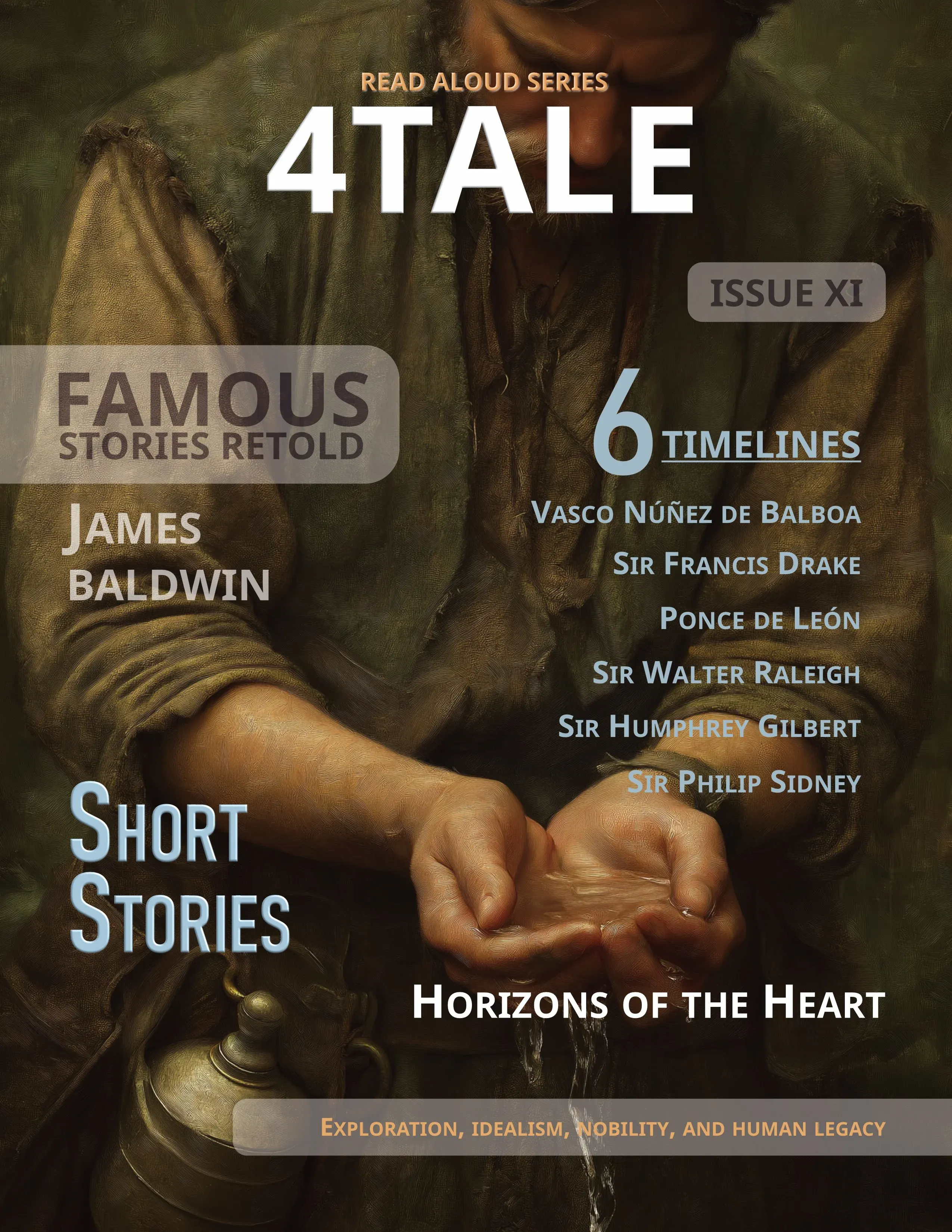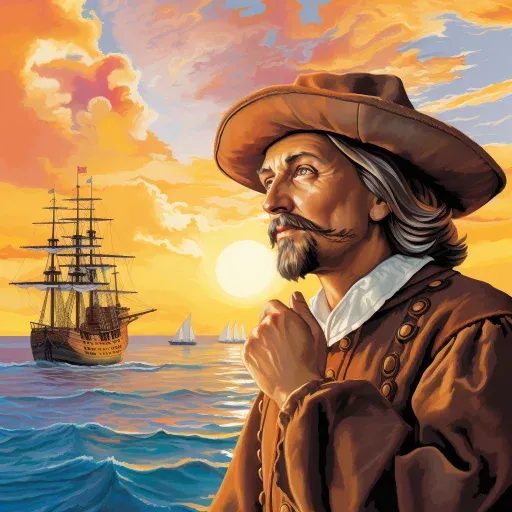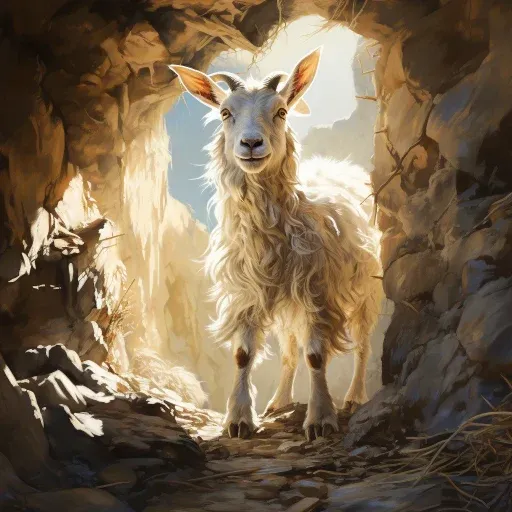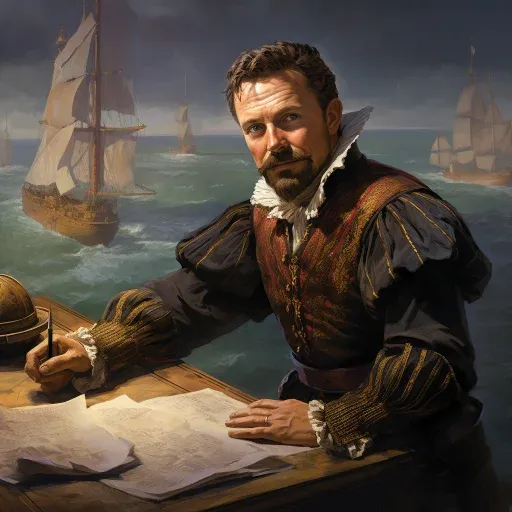BY JAMES BALDWIN
Upon a Peak in Darien-First Story
Famous Stories Retold: Story 2 of 30
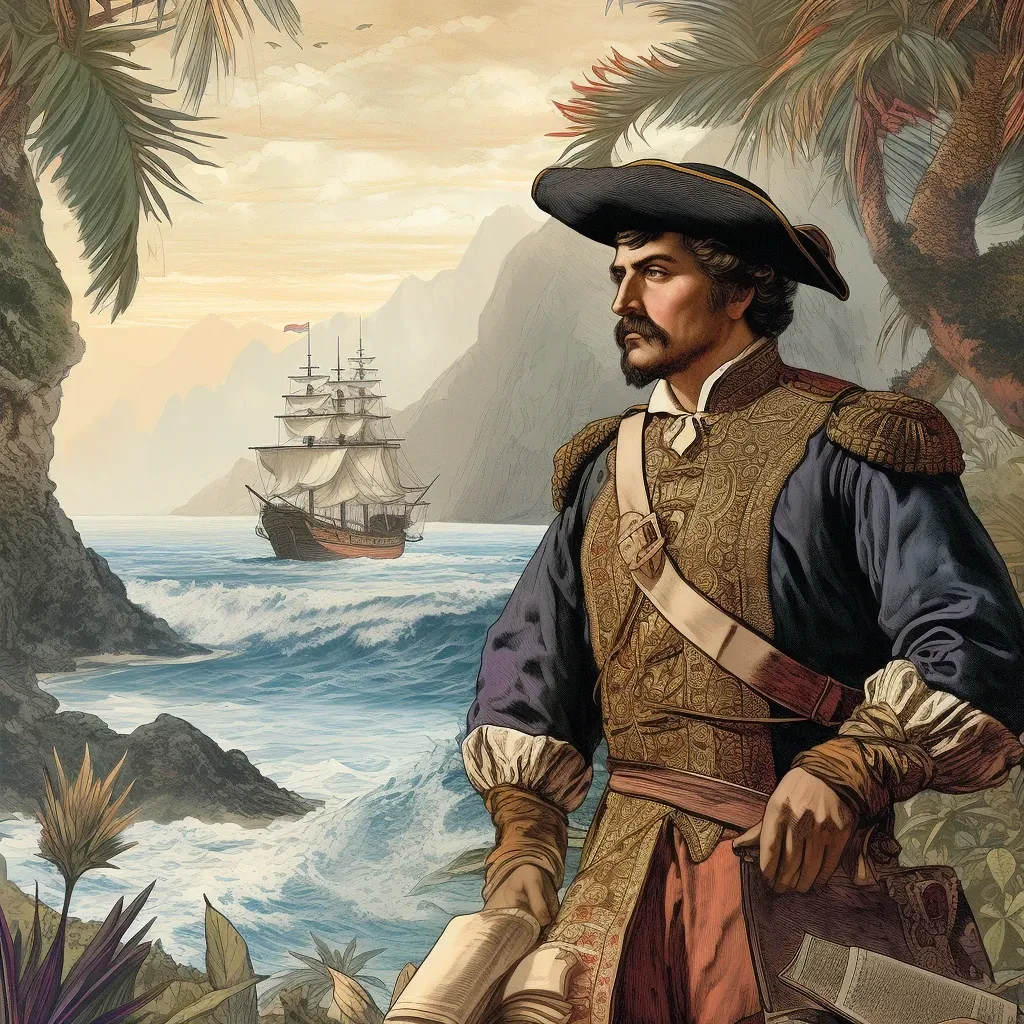
Heading

Balboa’s Adventure: Vasco Nunez de Balboa, hiding from debt collectors, stowed away in a barrel of provisions and became the leader of the expedition.
Alliance with the Indians: Balboa formed an alliance with a powerful Indian chief and married his daughter, receiving gold and slaves as gifts.
A good book we like, we explorers. That is our best amusement, and our best time killer
- Roald Amundsen, Explorer
Vasco Nunez de Balboa's Thrilling Quest for Gold
Embark on a thrilling voyage back in time, as we delve into the captivating tale of Vasco Nunez de Balboa, a name synonymous with daring adventure and relentless ambition. A tale of gold-lust that led to a groundbreaking discovery, this is a story that reveals a significant chapter in the annals of exploration. The intricate web of his exploits promises to reveal more than just a tale of conquest and exploration— it's a testament to humanity's ceaseless quest for the unknown. Join us, as we journey through a narrative laden with courage, intrigue, and a pivotal revelation that changed the world forever.
The Spanish Arrival to the New World and the Lure of the Indies
In the wake of Columbus's groundbreaking voyage, a surge of Spanish explorers set their sights on the New World. Enchanted by the promise of riches and glory, these adventurers journeyed to the far reaches of the Caribbean, including Haiti, Cuba, Porto Rico, and the smaller islands in their vicinity. Convinced that these lands were the fringe of the Asian continent, they referred to them as the Indies. However, as their geographical understanding evolved, these islands came to be known as the West Indies, distinguishing them from their far eastern counterparts, the East Indies.
Darien: The Land of Promise and Its Golden Secret
Nestled to the southwest of Cuba, a long coast named Darien by Columbus held an allure that was irresistible to the Spanish explorers. Today, we know this region as the Isthmus of Panama. Tales of gold in Darien sparked a fervor among the daring young men who had traversed the ocean in search of adventure. The cry, “To Darien! To Darien!” echoed among them, and soon, two ships set sail for this fabled land of promise. The journey was as thrilling as the destination, with fair winds, calm seas, and the anticipation of golden treasures waiting at the end of their voyage.
Dive Deeper 'Timeless Wisdom' Podcast
Video with Captions and Visualizer
Vasco Nunez de Balboa: An Unconventional Journey to Darien
Among the eager explorers was a particular young man named Vasco Nunez de Balboa. With a reputation for audacious adventures and lavish expenditures, Balboa found himself in debt and evading capture in Haiti. With quick thinking, he arranged to be hidden in a barrel among the ship's provisions, successfully smuggling himself aboard the vessel bound for Darien. His unorthodox arrival wasn't well received initially by the ship’s captain, but Balboa’s charisma and bravery soon won over the crew. His knowledge of the Darien coast proved invaluable, ensuring a safe harbor for the explorers and cementing his role as a pivotal figure in the pursuit of Darien's golden secret.
Rising Leadership and Tensions in Darien
As the Spanish settlers sailed toward Darien, their voyage was characterized by a sense of unity and shared purpose. However, this harmony was disrupted when a stowaway named Vasco Nunez de Balboa was discovered aboard. Balboa, despite his initial introduction as a debtor hiding in a barrel, soon proved to be a charismatic and effective leader. His pleasant demeanor and clear decisiveness quickly earned him the respect and admiration of his fellow sailors.
Recognizing his leadership potential, the settlers chose Balboa as their commander, rejecting their previous captain. Balboa led the group to a safe harbor in Darien, where they established their settlement. However, as the settlers began to interact with the local indigenous population, tensions began to rise.

The Revelation of the South Sea: A Discovery Beyond Imagination
Balboa's leadership extended beyond the realm of human relations and into the realm of exploration. Upon hearing tales from the natives about a vast body of water rich with gold, Balboa was inspired to search for this fabled sea. After an arduous journey through dense forests and over intimidating mountains, Balboa and his men reached the peak of the tallest mountain.
What they saw from the peak was a sight no white man had ever before seen or even heard of - a vast sea, stretching as far as the eye could see. This was the South Sea, later known as the Pacific Ocean. Balboa swiftly claimed it in the name of the King of Spain, setting the stage for future expeditions and conquests.
Balboa's Triumph and Tragedy: The Cruel Twists of Fate
Balboa's discovery of the South Sea marked a major triumph in his career as an explorer. However, his success was short-lived. Back in Darien, a new governor had arrived, bringing with him a cruel and oppressive regime. The governor's ruthless treatment of the indigenous population appalled Balboa and he sent word to Spain about the governor's actions.
While he waited for a response from the king, Balboa began preparations for his next voyage across the South Sea. However, before he could embark on his journey, the governor ordered his arrest, accusing Balboa of treachery. In a tragic twist of fate, the man who had risen from a stowaway to the discoverer of the South Sea was executed, marking a brutal end to a life of daring adventure and exploration.
Conclusion
As we disembark from this riveting journey into the life and legacy of Vasco Nunez de Balboa, we are left with a profound understanding of the man and the era he lived in. His relentless pursuit of gold led to an unexpected revelation—the Pacific Ocean, changing mankind's geographical perception. The stirring tale of Balboa is a testament to human courage, ambition, and the relentless quest for the unknown. His tragic end serves as a somber reminder of the fierce struggles and fatal power plays in a time of exploration and conquest.

